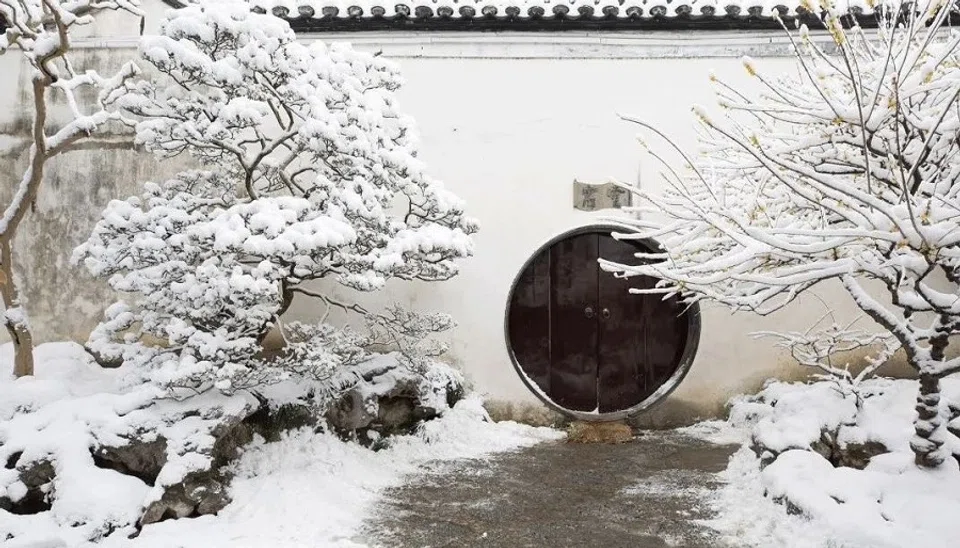What does Zhuangzi have to do with goldfish in a Suzhou winter pond?
Wintry scenes of snow-clad landscapes make one in the mood for poetry. One look at Suzhou's Tiger Hill Pagoda or the Humble Administrator's Garden blanketed in snow and ancient poets would have been lost in their reverie, producing great works. Cultural historian Cheng Pei-kai remembers the year 2018 when there was heavy snow in China's southern Jiangnan region.

My friends in Beijing complain about many things: sandstorms in spring, temperatures hitting over 40 degrees Celsius in summer, long droughts in autumn and winter - the list goes on. In fact, they complain the most about smogs, which can afflict the city all year round. But when I met them a few years ago, they were whining about there being no snow in Beijing - winter came and went without a decent snowflake in sight.
Wintry dreamscapes
And there was more to upset them: their relatives and friends from the Jiangnan region kept posting pictures online, boasting that it was snowing there and snowing buckets at that.
The images of snow-covered red plum blossoms looked like they were taken right out of a scene in Dream of the Red Chamber. One can imagine the protagonist breaking out in verse with this poignant line from a poem: "The north wind blew hard all night (一夜北风紧)."
Indeed, when Yangzhou snows, Slender West Lake becomes a mesmerising wonderland. When Nanjing snows, Xuanwu Lake is as beautiful as Yaochi (瑶池), the legendary home of the deity Queen Mother of the West. When Suzhou snows, the Tiger Hill Pagoda dons a white wedding gown and the Humble Administrator's Garden is littered with white jade. When Hangzhou snows, fallen snow on West Lake's Broken Bridge takes the breath away and the profile of Pagoda Baochu is as exquisite as that of the ancient Chinese beauty Xi Shi.
Using a Peking opera accent, a Beijing friend lamented, "Terrible! How terrible! How absolutely terrible! How dare the southerners boast about their snow scenes and exaggerate about how heavy their snowfalls have been! And how dare they allude to the classics in Yuan drama (元曲) and Tang poetry so indiscriminately! If even this can be tolerated, nothing else cannot be."

It's no wonder that the Beijingers are furious. They are the ones who get great winter views, not the southerners; they are the ones who have "exclusive rights" to breathtaking northern wintry scenes. Now, these pictures of the south have shaken their confidence.
But views of Jiangnan in winter, especially those of snow-covered classical Suzhou gardens, are indeed breathtaking. The cornices of snow-capped roof ridges brave the harsh winter wind, forming dark but elegant arches. The contrasting black and white tones are like the textures seen in ink works of Ming dynasty painter Dong Qichang.
Mesmerising scent of winter
Behind a fan-shaped window lies a burbling pond. The faint scent of a blooming wintersweet shrub on the wall of a path wafts into the small garden.
I am reminded of a poem by Northern Song dynasty poet Lin Hejing that roughly goes: "All the flowers have withered but the wintersweet stands alone; it is the most glorious sight in the garden. / The wintersweet's faint reflection is seen in the shallow water, and its scent lingers under the moonlight at dusk."
Poetry that ruminates on the wintersweet's charm at dusk may be more suited for describing gardenscapes after snowfall. Picturesque and poetic, these scenes are of the highest order in beauty and aesthetics. And that intoxicating fragrance carried by the wind seems exclusive to winter in Jiangnan - the northern regions do not experience this.
It is more common to hear that something is "a feast for the eyes/ears". But here we find "a feast for the nose" with regard to the beauty of scents. Coupled with the chilly wind that shocks the system like an ice-cold shower, we have truly entered a state of calm and clarity.

The weekend after heavy snowfall in Jiangnan, I returned to my humble abode in Suzhou. It stopped snowing about five days ago but the snow in my rock garden was still intact - the rocks looked like they were wearing white fur hats - how cute and fluffy! The snow shimmered and sparkled in the sunlight, and my rock garden looked like a piece of glistening Hetian jade - how absolutely stunning!
But my wife was more worried about the goldfish in the pond beneath the rocks. A layer of ice had formed on the pond, and she was afraid that they might have frozen to death. I ran to the pond and tried to peer beneath the ice. I spotted a few goldfish lying motionless at the bottom of the pond. Were they dead?
I watched closely for a couple of minutes and finally caught some movement: while their bodies were mostly stationary, their tail fins were wiggling gently, like the robe of a meditating monk that fluttered occasionally in the wind. There was obviously no wind or waves under an ice-sealed pond, so borrowing the words of the Sixth Patriarch, "not the wind; not the flag". But the heart is moving and the fish must be alive!
My wife was elated after learning that the fish had survived this great ordeal. Kneeling by the pond with a wooden stick, she began breaking the layer of ice. Thankfully, the ice was not too thick near the edge of the pond and she managed to make a one-metre-long crack after a few hard knocks and water splashed everywhere.
"Ah, everything is fine now. The fish are fine," I said. My wife glared at me and said fish need oxygen to survive. And in the heavy snow, they could have frozen to death. "Why don't you try it," she said. "I don't think you'd be so calm after being trapped for five days."

"I'm not a fish. There's no comparison," I teased.
Ah, as we stood by our little pond, snow in Suzhou put us in the shoes of Zhuangzi at the ancient River Hao (濠河), where he debated with his friend about the joy of fish.*
*Zhuangzi and Huizi were strolling on a bridge over the River Hao.
Zhuangzi said: "The fish are out swimming about. That is the 'Joy of Fish.'"
Huizi replied: "You are not a fish; from what do you know the joy of fish?"
Zhuangzi said: "You are not I; from what do you know whether I know the joy of fish?"
Huizi reposted: "I am not you, and so I can't know. It follows that since you are not a fish, you can't know the joy of fish. So there!"
Zhuangzi answered him: "The thing is, when you asked, 'From what can you know the joy of fish?' you already knew that I knew this in order to ask me what I knew it from. I knew it from the bridge over the River Hao!"
*Translation from Professor David K. Jordan's site on Zhuangzi.
Related: Diplomat, book addict, concubine and sage, all in an old alley of Suzhou | When a professor falls in love with Suzhou during the Cultural Revolution | A bowl of Suzhou noodles named by Emperor Qianlong | Cultural historian: Could we have eaten this elusive perch of Lake Tai? | Wintersweet scents in Jiangnan | Beijing's instant-boiled mutton and sweet memories of childhood days in Taiwan





![[Photos] Fact versus fiction: The portrayal of WWII anti-Japanese martyrs in Taiwan](https://cassette.sphdigital.com.sg/image/thinkchina/3494f8bd481870f7c65b881fd21a3fd733f573f23232376e39c532a2c7593cbc)